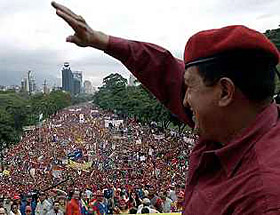 |
 |
 |
 News Around the Republic of Mexico | November 2005 News Around the Republic of Mexico | November 2005  
Fox's Office Says it Will Stay Out of Dispute with Venezuela
 Will Weissert - Associated Press Will Weissert - Associated Press


| | The long arm of Venezuelan President Hugo Chavez. |
Mexico City – President Vicente Fox's office said Tuesday it was no longer going to get involved in a diplomatic flap between Mexico and Venezuela that prompted both countries to withdraw their ambassadors.

"For us, the case is now closed," Fox spokesman Ruben Aguilar said during his daily briefing with reporters. "We hope that in coming weeks and months, relations cool off so that we can re-establish them to their highest level."

Aguilar called "lamentable" the dispute that began last week when Venezuelan President Hugo Chavez called Fox a "puppy" of the United States. Tensions reached a boiling point on Sunday when the Venezuelan leader warned his Mexican counterpart during a six-hour radio and television broadcast: "Don't mess with me, sir, because you'll get stung."

Another spokesman for Fox, who said he wasn't authorized to speak on the record, said Mexico's presidency will not respond to further comments made by Chavez and will leave negotiations to re-establish diplomatic ties between the two countries to Foreign Secretary Luis Ernesto Derbez.

Mexican government officials have insisted that the recall of ambassadors does not mean Venezuela and Mexico have severed ties completely since trade and cultural relations remain unchanged.

This country's ambassador to Venezuela, Enrique Loaeza, arrived at Mexico City's airport Tuesday but refused to comment.

Hours earlier, Venezuela's ambassador to Mexico, Vladimir Villegas, returned to his homeland's capital, Caracas, and said there was no need for his government to apologize.

Mexico originally gave Venezuela until midnight Monday to say it was sorry for its president's threat, but Chavez's government decided to pull Villegas out before the ambassador could be asked to leave.

Although Fox still insisted Monday on an apology, Aguilar suggested Tuesday that relations could improve by other means.

"It's necessary to calm relations, but there are many ways to do that," he told The Associated Press. "There are many ways to lessen the aggression on the part of the Venezuelan government."

The dispute began at the Summit of the Americas earlier this month in Argentina, where Fox defended the U.S.-backed plan for a regional free trade pact and Chavez publicly scoffed at the proposal.

Chavez, who took office in 1999, has had his share of diplomatic clashes.

Venezuelan tensions arose with Chile in 2003 after Chavez suggested landlocked Bolivia should have access to the Pacific Ocean – something it lost in a war with Chile in the 1800s. A dispute with Colombia arose in January over the capture of a Colombian rebel in Caracas, which Chavez said violated Venezuelan sovereignty.

In both cases, things calmed down as leaders opted for diplomacy.

On Tuesday, Argentine President Nestor Kirchner, who also engaged in a verbal duel with Fox following the summit, announced he will visit Caracas over the weekend to meet with Chavez, in what could be seen as a sign of support for the Venezuelan leader.

Carlos Blanco, a political analyst in Caracas, said Fox is in a better position to answer Chavez's verbal attacks then many other nations because Mexico – unlike the United States and much of Central America – does not rely on Venezuela for oil.

"It seems that this time Chavez picked the wrong person to fight with," Blanco said. "Mexico is historically a country that generates sympathy in Latin America, exactly the opposite from the United States."

But Adolfo Salgueiro, a Venezuelan professor of international law, said Chavez kept criticizing Fox and pushed the dispute to a higher level because the international stakes weren't very high.

"Fighting with Fox, whose government ends next year and whose party has little possibility of re-election, doesn't have major consequences," Salgueiro said.

Fox's six-year term ends in December 2006 and he is barred by law from running again. His conservative National Action Party's presidential candidate, Felipe Calderon, trails badly in public opinion polls to replace him ahead of elections next summer.

Associated Press Writer Jorge Rueda contributed to this report from Caracas, Venezuela. | 
 | |
 |



